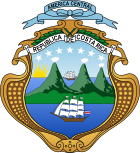| ||||||||||||||||||||||||||||||||||||||||||||||||||
|
| ||||||||||||||||||||||||||||||||||||||||||||||||||
Presidential election | ||||||||||||||||||||||||||||||||||||||||||||||||||
| Turnout | 69.99% ( | |||||||||||||||||||||||||||||||||||||||||||||||||
|---|---|---|---|---|---|---|---|---|---|---|---|---|---|---|---|---|---|---|---|---|---|---|---|---|---|---|---|---|---|---|---|---|---|---|---|---|---|---|---|---|---|---|---|---|---|---|---|---|---|---|
| ||||||||||||||||||||||||||||||||||||||||||||||||||
 Results by canton | ||||||||||||||||||||||||||||||||||||||||||||||||||
| ||||||||||||||||||||||||||||||||||||||||||||||||||
All 57 seats in the Legislative Assembly 29 seats needed for a majority | ||||||||||||||||||||||||||||||||||||||||||||||||||
This lists parties that won seats. See the complete results below.
| ||||||||||||||||||||||||||||||||||||||||||||||||||
 |
|---|
|
|
General elections were held in Costa Rica on 1 February 1998.[1] Miguel Ángel Rodríguez of the Social Christian Unity Party won the presidential election, whilst his party also won the parliamentary election. Voter turnout was 70%, the lowest since the 1950s.[2]
An economic recession, a teachers' strike due to a pensions' reform and some corruption scandals made President José María Figueres' government highly unpopular. Thus, government endorsed candidate José Miguel Corrales tried to distance himself from Figueres as much as possible. Corrales won over former President of Congress Jorge Walter Coto Molina in PLN's primaries but the discovery of Voter fraud damaged PLN's image and split the party.[3] On the contrary in PUSC, previous candidate Miguel Ángel Rodríguez was seen as the natural nominee for this election, and despite the fact that deputy Luis Fishman was rumored as a possible internal opponent, he finally declined and Rodríguez was nominated without the need of primaries, thus keeping the party united. During Figueres' administration the so call Figueres-Calderón Pact was signed between the leaders of the two main parties (and sons of the two caudillos of the 1948 civil war); him and Rafael Ángel Calderón Fournier (Rodríguez political rival) to approve several mutually beneficial laws for both major parties, something that caused outrage among large segments of the population and started the downfall of the two-party system.[4]
- ^ Dieter Nohlen (2005) Elections in the Americas: A data handbook, Volume I, p155 ISBN 978-0-19-928357-6
- ^ Nohlen, pp156-157
- ^ Fernández, Oscar Costa Rica. La reafirmación del bipartidismo Revista Nueva Sociedad No.131, PP. 4-10
- ^ "Copia archivada". Archived from the original on 5 July 2013. Retrieved 13 July 2013.



